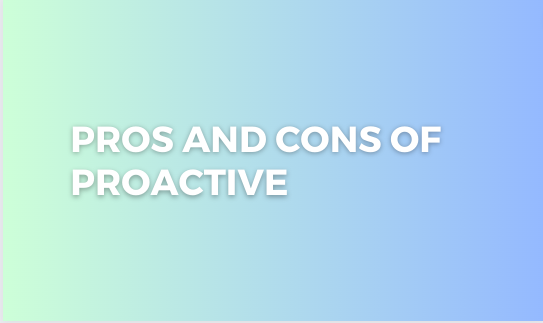Being proactive refers to taking initiative and being anticipatory in one’s actions and decisions. It involves actively seeking opportunities, solving problems before they arise, and taking responsibility for one’s own outcomes. In this analysis, we will explore pros and cons of being proactive to understand its potential benefits and drawbacks.
Pros:
- Greater control over outcomes: Being proactive allows individuals to take control of their lives and influence the outcomes they desire.
- Increased productivity: Proactive individuals tend to be more productive as they prioritize tasks, set goals, and take timely action.
- Improved problem-solving skills: Being proactive enhances problem-solving skills by identifying potential issues early and finding effective solutions.
- Enhanced personal growth: Proactivity promotes personal growth by fostering a mindset of continuous improvement and learning.
- Better time management: Proactive individuals manage their time effectively, prioritizing important tasks and avoiding procrastination.
- Heightened self-confidence: Taking proactive steps builds self-confidence as individuals see themselves as capable and empowered.
- Improved decision-making: Being proactive helps individuals make informed decisions based on foresight and careful consideration.
- Increased adaptability: Proactivity enables individuals to adapt quickly to changing circumstances and find alternative solutions.
- Stronger relationships: Being proactive in communication and problem-solving fosters stronger and more positive relationships.
- Efficient resource allocation: Proactive individuals allocate resources wisely, maximizing efficiency and minimizing waste.
- Opportunity maximization: Being proactive helps individuals seize opportunities before they pass by, leading to personal and professional growth.
- Positive mindset: Proactivity cultivates a positive mindset by focusing on solutions and possibilities rather than dwelling on problems.
- Effective stress management: Proactive individuals tend to experience lower levels of stress as they take proactive measures to prevent and manage stressful situations.
- Improved health and well-being: Proactive individuals prioritize their health and well-being, taking preventive measures and adopting healthy habits.
- Enhanced creativity: Proactivity stimulates creativity by encouraging individuals to think outside the box and find innovative solutions.
- Goal achievement: Being proactive increases the likelihood of achieving goals by taking consistent action and overcoming obstacles.
- Improved organizational skills: Proactive individuals develop strong organizational skills, enabling them to stay focused and efficient.
- Better problem anticipation: Being proactive allows individuals to anticipate potential problems and take preventive measures.
- Stronger leadership abilities: Proactive individuals demonstrate strong leadership qualities by taking initiative and inspiring others.
- Increased resilience: Proactivity builds resilience by enabling individuals to bounce back from setbacks and adapt to new challenges.
Cons:
- Overwhelming workload: Being proactive can sometimes lead to an overwhelming workload as individuals take on multiple responsibilities and tasks.
- Perceived as overly assertive: Some people may perceive proactive individuals as overly assertive or aggressive.
- Potential for burnout: Constantly taking proactive action without adequate rest and self-care can lead to burnout.
- Risk of overstepping boundaries: Being proactive may lead individuals to overstep boundaries or interfere with others’ responsibilities.
- Time-consuming: Being proactive requires investing time and effort in planning, anticipating, and taking action.
- Resistance to change: Proactive individuals may face resistance from others who are resistant to change or prefer a more reactive approach.
- Increased stress levels: The responsibility of taking proactive action can sometimes lead to increased stress levels.
- Potential for misjudgment: Proactive individuals may misjudge situations or make decisions based on incomplete information.
- Lack of spontaneity: Being proactive may result in a structured and planned approach, leaving less room for spontaneity and improvisation.
- Difficulty in delegating: Proactive individuals may struggle with delegating tasks, as they prefer to take responsibility for outcomes themselves.
- Perceived as controlling: Some individuals may perceive proactive behavior as controlling or micromanaging.
- Risk of neglecting present moment: Focusing too much on future outcomes can sometimes lead to neglecting the present moment and opportunities.
- Potential for information overload: Being proactive may involve gathering and analyzing a large amount of information, leading to information overload.
- Resistance from others: Proactive individuals may face resistance or pushback from individuals who prefer a more passive or reactive approach.
- Increased expectations: Being proactive may raise expectations from others, leading to added pressure and accountability.
- Potential for unrealistic goals: Proactivity can sometimes lead to setting overly ambitious or unrealistic goals.
- Limited flexibility: Being proactive may limit flexibility and spontaneity in decision-making and problem-solving.
- Possible disregard for others’ perspectives: Proactive individuals may prioritize their own perspectives and ideas, potentially disregarding others’ viewpoints.
- Perceived as intrusive: Some individuals may perceive proactive behavior as intrusive or interfering in their affairs.
- Risk of premature actions: Being proactive may lead to premature actions or decisions without fully understanding the situation.
Pros
- Greater control over outcomes
- Increased productivity
- Improved problem-solving skills
- Enhanced personal growth
- Better time management
- Heightened self-confidence
- Improved decision-making
- Increased adaptability
- Stronger relationships
- Efficient resource allocation
- Opportunity maximization
- Positive mindset
- Effective stress management
- Improved health and well-being
- Enhanced creativity
- Goal achievement
- Improved organizational skills
- Better problem anticipation
- Stronger leadership abilities
- Increased resilience
Cons
- Overwhelming workload
- Perceived as overly assertive
- Potential for burnout
- Risk of overstepping boundaries
- Time-consuming
- Resistance to change
- Increased stress levels
- Potential for misjudgment
- Lack of spontaneity
- Difficulty in delegating
- Perceived as controlling
- Risk of neglecting present moment
- Potential for information overload
- Resistance from others
- Increased expectations
- Potential for unrealistic goals
- Limited flexibility
- Possible disregard for others’ perspectives
- Perceived as intrusive
- Risk of premature actions



